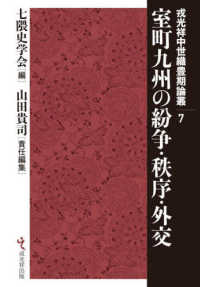Full Description
This book, in its first part, contains units of conceptual history of several topics of physics based on the research in physics education and research based articles with regard to several topics involved in teaching science in general and physics in particular. The second part of the book includes the framework used, the approach considering science knowledge as a special type of culture - discipline-culture. Within this approach, scientific knowledge is considered as comprised of a few inclusive fundamental theories each hierarchically structured in a triadic pattern: nucleus-body-periphery. While nucleus incorporates the basic principles and body comprises their implementations in the variety of laws, models, and experiments, periphery includes concepts at odds to the nucleus. This structure introduces knowledge in its conceptual variation thus converting disciplinary knowledge to cultural-disciplinary one. The approach draws on history and philosophy of science (HPS) necessary for meaningful learning of science. It is exemplified in several aspects regarding teaching physics, presenting history in classes, considering the special nature of science, and using artistic images in regular teaching. The revealed conceptual debate around the chosen topics clarifies the subject matter for school students and teachers encouraging construction of Cultural Content Knowledge. Often missed in teachers' preparation and common curriculum it helps genuine understanding of science thus providing remedy of students' misconceptions reported in educational research.
Contents
Part I. Conceptual Excursus.- 1 Understanding Classical Mechanics: A Dialogue with the Cartesian Theory of Motion.- 2 De Motu -The History of the Understanding of Motion, from Aristotle to Newton.- 3 Optical Image and Vision: From Pythagoras to Kepler.- 4 Inertial Force - The Unifying Concept.- 5 Weight Concept: From Aristotle to Newton and then to Einstein.- Part II Perspectives.- 6 Scientific Knowledge as a Culture - a Paradigm of Knowledge Representation for the Meaningful Teaching and Learning Science.- 7 Teaching Optics: A Historico-Philosophical Perspective.- 8 From Comparison between Scientists to Gaining Cultural Scientific Knowledge - Leonardo and Galileo.- 9 A Refined Account of Nature of Science.- 10 On the Power of Fine Arts Pictorial Imagery in Science Education.- 11 Epilogue - Discipline-Culture for the Pleasure of Understanding.







